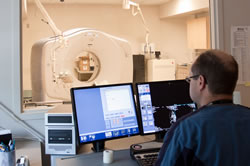CT Scans
You may need a CT scan as a result of illness or injury, or when a doctor suspects a medical problem that cannot easily be detected with a routine physical examination. RVH offers CT scans using the latest generation of CT technology from GE Healthcare. This advanced equipment allows us to produce images of unprecedented detail in a very short time using lower radiation doses.
 Sometimes called a CAT scan, CT is an abbreviation for a diagnostic procedure called Computed Tomography. This is a valuable medical exam that combines x-rays and sophisticated computers to generate detailed anatomical images. CT scans have been performed safely and successfully for almost 30 years.
Sometimes called a CAT scan, CT is an abbreviation for a diagnostic procedure called Computed Tomography. This is a valuable medical exam that combines x-rays and sophisticated computers to generate detailed anatomical images. CT scans have been performed safely and successfully for almost 30 years.
A CT scan is a non-invasive procedure, allowing physicians to see inside your body via the 2-D images it generates. Using a computer, these images can also be presented in 3-D for in-depth clinical evaluation.
The staff at RVH is here to make your test as pleasant and comfortable as possible. If you have any questions or concerns regarding your exam, please check below for Frequently Asked Questions and What You Should Know , or talk to your physician or one of our CT Technologists.
What You Should Know
Your physician and/or CT technologist will explain the specific details of your upcoming examination. However, the following general information will also be of use to you before you attend your appointment.
The Procedure
When you arrive for your appointment, a technologist will take you to the CT scanning room, where you will see a table and a large doughnut-shaped device, called a gantry. Our technologist will ask you to lie on the padded table and make sure you're comfortable. You will be asked to lie very still during the scan and hold your breath for a short time to minimize any body movement.
During the scan, you might hear a humming or buzzing noise, but you should not feel anything unusual. You may feel the table move while we take images of certain parts of your body. The technologist will monitor you through a window during the entire scan and will communicate with you through an intercom.
Depending on the exam, a solution called "contrast" may be administered with an IV to help improve accuracy. Because of this, it is very important to let your doctor and CT technologist know beforehand if you've ever had an allergic reaction to contrast (x-ray dye).
The Diagnosis
We use state-of-the-art computers and equipment to produce diagnostic images. Your CT radiologist will analyze and interpret your images and provide a report to your doctor or specialist.
Questions or Concerns
It is natural to have questions or concerns about your CT scan. Please don't hesitate to discuss them with your doctor or specialist.
Frequently Asked Questions
How long does a CT scan take?
The length of your exam is dependant on the part of the body being scanned. For a scan of your abdomen or pelvis, we give you a drink to highlight your stomach and intestines. While the scan itself only takes a few seconds, the drink takes 60 minutes to reach the desired location. Expect to be in our CT department for around 90 minutes. For any other scans, allow 15 to 30 minutes, including the time it takes for the technologist and/or radiologists to review the images.
How safe is a CT examination?
CT is a safe and effective diagnostic procedure. In fact, millions of CT exams are performed in Canada every year. Like many other imaging technologies, the latest VCT systems have been designed to include dose-reduction features, minimizing your exposure to radiation. The profession is supported by the Canadian Association of Medical Radiation Technologists (CAMRT), which provides continuing education, certification and a registry of radiology technologist. Our healthcare professionals are experts who can safely and skillfully operate the CT scanner, obtaining the best images to assist your doctor in making an accurate diagnosis.
Will I know the results of my CT scan immediately?
The CT radiologist will analyze and interpret your images and provide a report to your doctor or specialist.